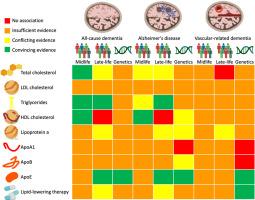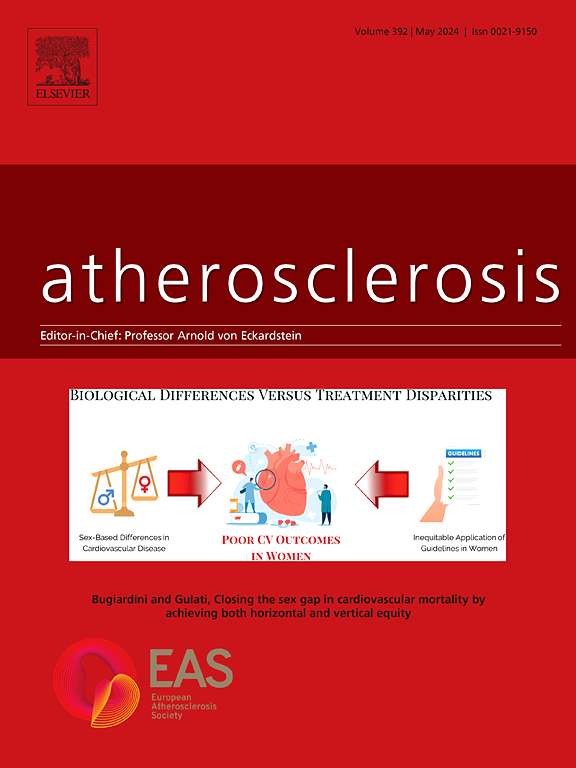Lipids, lipoproteins, and apolipoproteins: Associations with cognition and dementia
IF 4.9
2区 医学
Q1 CARDIAC & CARDIOVASCULAR SYSTEMS
引用次数: 0
Abstract
Due to increasing lifespan and aging populations globally there has been a steep rise in late-life dementia, which is now the second most common cause of death in high-income countries. In general, dementia can be divided into two major groups: Alzheimer's disease (AD) and vascular-related dementia (VD). AD is pathologically characterised by senile plaques containing amyloid-β and neurofibrillary tangles composed of hyperphosphorylated tau, whereas VD is dominated by vascular pathology such as cerebral small vessel disease, major strokes, and white matter lesions. Recently, the importance of vascular components in AD is increasingly recognized and it is estimated that up to 45 % of all dementia cases can be prevented by preventing or treating midlife cardiovascular risk factors such as physical inactivity, diabetes, and hypertension. Even though the brain contains approximately 25 % of the total body cholesterol pool, and several genetic variants related to the lipid metabolism have been identified in genome-wide associations studies of AD, the role of lipids, lipoproteins, and apolipoproteins in dementia risk is less well-known.
In this review, we go through the current literature on lipids, lipoproteins, and apolipoproteins and risk of dementia. We conclude that the evidence is primarily insufficient or conflicting, possibly due to nonoptimal study designs. The future calls for large, prospective studies of midlife measurements of lipids, lipoproteins, and apolipoproteins and one-sample, individual level data Mendelian randomization studies to overcome survival bias. However, the current literature suggests that it is safe to say that what is good for the heart is good for the brain.

血脂、脂蛋白和脂蛋白:与认知能力和痴呆症的关系
由于全球寿命延长和人口老龄化,晚年痴呆症的发病率急剧上升,目前已成为高收入国家的第二大常见死因。一般来说,痴呆症可分为两大类:阿尔茨海默病(AD)和血管相关性痴呆(VD)。阿尔茨海默病的病理特征是含有淀粉样蛋白-β的老年斑和由高磷酸化 tau 组成的神经纤维缠结,而血管性痴呆则以血管病变为主,如脑小血管疾病、重大中风和白质病变。最近,血管病变在老年痴呆症中的重要性日益得到认可,据估计,通过预防或治疗中年期心血管风险因素(如缺乏运动、糖尿病和高血压),可预防高达 45% 的痴呆症病例。尽管大脑中的胆固醇约占人体胆固醇总量的 25%,而且在注意力缺失症的全基因组关联研究中发现了一些与脂质代谢有关的基因变异,但脂质、脂蛋白和载脂蛋白在痴呆症风险中的作用却鲜为人知。我们得出的结论是,证据主要不足或相互矛盾,这可能是由于非最佳研究设计造成的。未来需要对血脂、脂蛋白和脂蛋白的中年测量进行大型前瞻性研究,并进行单样本、个体水平数据的孟德尔随机研究,以克服生存偏倚。不过,目前的文献表明,可以肯定地说,对心脏有益的东西就是对大脑有益的东西。
本文章由计算机程序翻译,如有差异,请以英文原文为准。
求助全文
约1分钟内获得全文
求助全文
来源期刊

Atherosclerosis
医学-外周血管病
CiteScore
9.80
自引率
3.80%
发文量
1269
审稿时长
36 days
期刊介绍:
Atherosclerosis has an open access mirror journal Atherosclerosis: X, sharing the same aims and scope, editorial team, submission system and rigorous peer review.
Atherosclerosis brings together, from all sources, papers concerned with investigation on atherosclerosis, its risk factors and clinical manifestations. Atherosclerosis covers basic and translational, clinical and population research approaches to arterial and vascular biology and disease, as well as their risk factors including: disturbances of lipid and lipoprotein metabolism, diabetes and hypertension, thrombosis, and inflammation. The Editors are interested in original or review papers dealing with the pathogenesis, environmental, genetic and epigenetic basis, diagnosis or treatment of atherosclerosis and related diseases as well as their risk factors.
 求助内容:
求助内容: 应助结果提醒方式:
应助结果提醒方式:


